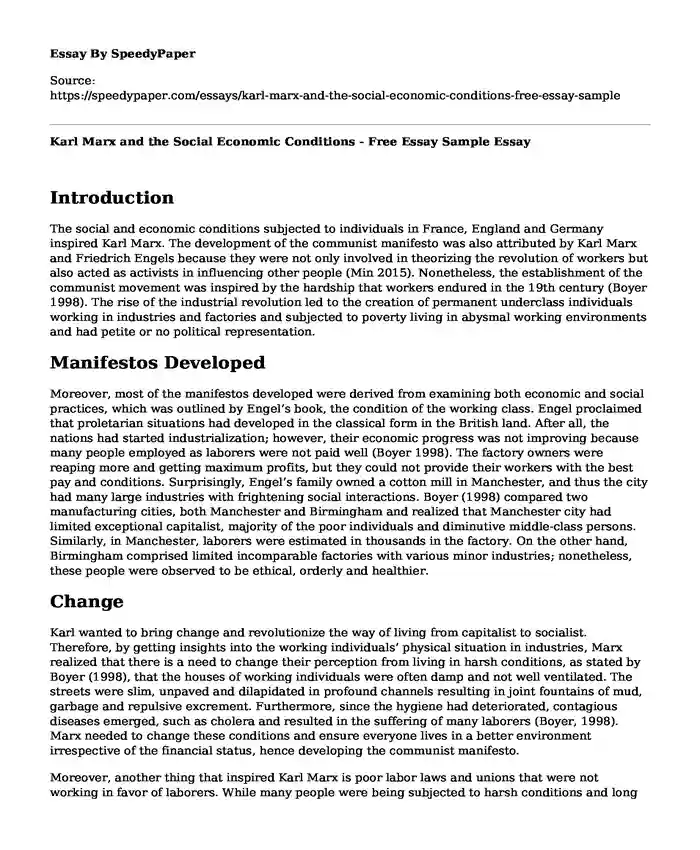Introduction
The social and economic conditions subjected to individuals in France, England and Germany inspired Karl Marx. The development of the communist manifesto was also attributed by Karl Marx and Friedrich Engels because they were not only involved in theorizing the revolution of workers but also acted as activists in influencing other people (Min 2015). Nonetheless, the establishment of the communist movement was inspired by the hardship that workers endured in the 19th century (Boyer 1998). The rise of the industrial revolution led to the creation of permanent underclass individuals working in industries and factories and subjected to poverty living in abysmal working environments and had petite or no political representation.
Manifestos Developed
Moreover, most of the manifestos developed were derived from examining both economic and social practices, which was outlined by Engel’s book, the condition of the working class. Engel proclaimed that proletarian situations had developed in the classical form in the British land. After all, the nations had started industrialization; however, their economic progress was not improving because many people employed as laborers were not paid well (Boyer 1998). The factory owners were reaping more and getting maximum profits, but they could not provide their workers with the best pay and conditions. Surprisingly, Engel’s family owned a cotton mill in Manchester, and thus the city had many large industries with frightening social interactions. Boyer (1998) compared two manufacturing cities, both Manchester and Birmingham and realized that Manchester city had limited exceptional capitalist, majority of the poor individuals and diminutive middle-class persons. Similarly, in Manchester, laborers were estimated in thousands in the factory. On the other hand, Birmingham comprised limited incomparable factories with various minor industries; nonetheless, these people were observed to be ethical, orderly and healthier.
Change
Karl wanted to bring change and revolutionize the way of living from capitalist to socialist. Therefore, by getting insights into the working individuals’ physical situation in industries, Marx realized that there is a need to change their perception from living in harsh conditions, as stated by Boyer (1998), that the houses of working individuals were often damp and not well ventilated. The streets were slim, unpaved and dilapidated in profound channels resulting in joint fountains of mud, garbage and repulsive excrement. Furthermore, since the hygiene had deteriorated, contagious diseases emerged, such as cholera and resulted in the suffering of many laborers (Boyer, 1998). Marx needed to change these conditions and ensure everyone lives in a better environment irrespective of the financial status, hence developing the communist manifesto.
Moreover, another thing that inspired Karl Marx is poor labor laws and unions that were not working in favor of laborers. While many people were being subjected to harsh conditions and long working hours with fewer wages, the labor unions were doing little to nothing in helping workers. For instance, some factories employed children; however, the laws that were developed to protect laborers prohibited children from working in textile industries. Nevertheless, it permitted them to work in the lace and silk industries (Boyer 1998).
Conclusion
Furthermore, individuals within the age of 10-12 were protected in working hours and allowed to work for a maximum of nine hours a day, while those amid 13-17 were to work for a maximum of twelve hours (Min 2015). Thus, Marx understood well about the labor theory and therefore, saw the need for presenting distressing intellectual encounter of laissez-faire economist and wanted to show that capitalist was exploiting laborers by overworking and underpaying them to reduce the cost of production.
References
Boyer, G. R. (1998). The historical background of the Communist Manifesto. Journal of Economic Perspectives, 12(4), 151-174.
https://pubs.aeaweb.org/doi/pdf/10.1257/jep.12.4.151
Min, S. (2015). Comparative study on the political philosophy of Rousseau and Marx through Marx’s communist manifesto. Canadian Social Science, 11(6), 98-103.
http://dx.doi.org/10.3968/%25x.
Cite this page
Karl Marx and the Social Economic Conditions - Free Essay Sample. (2023, Nov 24). Retrieved from https://speedypaper.com/essays/karl-marx-and-the-social-economic-conditions-free-essay-sample
Request Removal
If you are the original author of this essay and no longer wish to have it published on the SpeedyPaper website, please click below to request its removal:
- Essay Example for Free: Slavery and Freedom - The American Paradox
- Ancient Ethics - Essay Example in Philosophy
- President Andrew Jackson and the Removal of Indians
- Essay Sample: Do Parents Have Different Hopes or Standards for Their Son and Their Daughter?
- Essay Sample on Changes From the American Revolution to Reconstruction
- United States History. Free Paper
- Free Essay: L. Perkins's "Bound to Them By a Common Sorrow"
Popular categories





